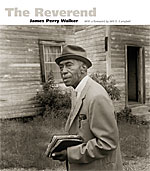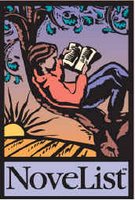

My Mission...Not Impossible...Make Mississippi Read!
I never read without making sure I am in a secure position. I have been like this ever since the age of seven when, sitting on a high wall and reading The Water Babies, I was so seduced by the descriptions of underwater life that I unconsciously relaxed my muscles. Instead of being held buoyant by the water that so vividly surrounded me in my mind, I plummeted to the ground and knocked myself out. I can still feel the scar under my fringe now. Reading can be dangerous. (pg 4)
 I won a book
I won a book
from my favorite Brit blog,
Reading Matters!
A copy of
A Wild Ride up the Cupboards by Ann Bauer,
will be skipping across the pond just for me.
Yippee!
Thanks Kim
For Delta Librarian, The End 
After decades of doing
battle with illiteracy,
poverty, racism and the
elements in Mississippi,
Ronnie Wise is walking away.
By J.R. Moehringer,
LA Times Staff Writer
September 23, 2006
Francine Orr, LA Times Staff Photographer
CLEVELAND, Miss. — It's not easy to escape the Delta. People have been writing songs for 100 years about how hard it is to escape, especially this part of the Delta, where the crushing poverty and the heat storms and the ghost towns get hold of you and won't let go.
Some used to hop a train out, but the trains don't stop here anymore. Some worked their way out, but jobs have gotten scarce. Few dreamed of escaping through books. Then Ronnie Wise came along.
How many have learned to read because of Wise? He lost count long ago. Hundreds, maybe thousands. He doesn't care. As director of libraries for Bolivar County, one of America's least literate places, where 41% of 40,000 residents can't read, Wise keeps his mind on what needs doing, not what's been done, which might be why he looks so cranky.
He glances out his office and spots someone headed toward Fiction, meaning another reader will soon discover the picklock words of Flannery O'Connor or Joseph Conrad, another person will soon escape the Delta, using one of Wise's libraries as the point of departure. Such is the hope, anyway, that's given shape to Wise's last 30 years.
It's a long time for anybody at one job, 30 years. For Wise it feels like 130, because he's spent most of it fighting arsonists, bureaucrats, censors, racists, tornadoes, apathy, poverty, thieves — and mold, that insidious green carpetbagger. He used to enjoy a good, clean fight, but less so lately. Lately, the hours have felt like days, the days like compressed eternities.
But eternity ends today. Come 5 o'clock, Wise is taking early retirement. For once it's his turn to escape.
No one knows just why Wise is retiring, or what happens next, to this part of the Delta or to him, and that might be another reason he looks so cranky. Every escape, after all, is an anxious and secretive undertaking.
Then again, Wise always looks cranky.
People just don't realize the stress of a Mississippi librarian's life, he says. People don't understand what it takes to keep those front doors open — or what's at stake if you don't. Reading, Wise believes, is life. Illiteracy, therefore, is death. He witnesses its stranglehold every day. Shopping at the grocery store, standing in line at the bank or post office, he's constantly accosted by strangers trying to conceal their secret behind the same lie. "Excuse me," they say. "Forgot my glasses — could you tell me what this says?"
People call him a librarian, and he surely looks like a librarian, with his sedentary frame, thick eyeglasses, fastidiously trimmed hair and goatee. But, deep down, he feels like something else, something more. He feels like the Sisyphus of Mississippi. He feels like a superhero in one of his beloved comic books, even though he fights the forces of darkness with little more than night classes and meager grants, and he loses more than he wins; 30 years of that would make even Spiderman cranky.
So thoroughly has Wise devoted himself to crusading for literacy, to creating a book-lined fortress in the middle of the book-starved Delta, that everyone around here figured he'd die among his books. "Just felt like it was time to close this chapter of my life," he tells them all with a tight smile.
A nonexplanation, which keeps questioners at bay. Precisely as it's meant to do.
Wise doesn't like to talk about his reasons, or his feelings, especially when it comes to his 10 libraries, which he loves like the children he never had. Some things go beyond words, even for a divorced 55-year-old librarian who's dedicated his life to the furtherance and cherishment of words.
He'll admit this much: He's done with the Delta. Born in Memphis, Tenn., raised in Webb, Miss., he's never lived anywhere else and he's ready for a change. He hates change, clings to his 1986 computer and keeps phone numbers in his checkbook because he refuses to figure out his cellphone, but today he's making the biggest change of all. Leaving the Delta. He's proud of his home, and desperate to escape it, and the contradictions about him only start there. Kind and rude, eloquent and reticent, he's an altruistic loner, a misanthropic do-gooder, a study in inscrutability straight out of Eudora Welty or William Faulkner.
He's a literacy crusader who's hard to read.
But there's a strange look in his eye today, a faint gleam that suggests this day could be different. Maybe, before 5 o'clock, with nothing to lose and no consequence if he offends anyone, Wise will stop concealing his secret. Or at least drop a hint as to why he's leaving.
Such is the hope, anyway, that gives shape to his Last Day.
The year was 1967, when a young man from Red Banks, Miss., James Perry Walker, decided to make a difference. Right out of college, he began work as a Head Start teacher at Gatewood Baptist Church in Slayden, Miss. Picture a group of awestruck children surrounding him as he read Where the Wild Things Are by Maurice Sendak.
At the time, Gatewood Baptist Church was
a ragged, tumbling wood frame structure with tilted steeple, sinking foundations, and loose planks bowing from the ceilingor in real estate jargon, a bona fide “fixer upper.” It was here, while attending a fall-morning revival service, Walker met the focus of his six-year photographic quest.
seemed to fill the shoes of Maritain’s ideal philosopher, who shared with Martin Luther his bluntness of speech and love of dogs, with Erasmus his reverence for learning and proverbs and his rigorous suspension of judgment, with Paracelsus his vision of the world as capable, at any moment, of epiphany and revelation.
A preacher whose livelihood depends on the favor of his congregation faces a constant temptation to temper the Word to suit his worldly benefactors.
 The Reverend contains 79 black and white photos filling the pages with atmosphere and passion. Children on their way to school, well-worn church buildings, teen boys in their best Sears pose, black choir robes drying in a morning fog, mourners at a funeral, an innocence of a virginal baptism, and the strong images of Reverend Cole preaching are just a few of the scenes in this book.
The Reverend contains 79 black and white photos filling the pages with atmosphere and passion. Children on their way to school, well-worn church buildings, teen boys in their best Sears pose, black choir robes drying in a morning fog, mourners at a funeral, an innocence of a virginal baptism, and the strong images of Reverend Cole preaching are just a few of the scenes in this book.Tags: Booktalk

Have you ever finished a book and thought, “Boy that was great! Can I read something else just like it?” Maybe you just finished all the Stephanie Plum mysteries by Janet Evanovich and want another author who writes like her.
I have had patrons describe a book they read years ago, and all they can remember is a character’s name or plot. Their question to me, “Do you know the title or author?” Um, some days I’m lucky if I remember my name much less a title of a book.
This week I gave a brief talk to the faculty at Northwest about a versatile database available to all Mississippians called NoveList. Through the Mississippi Alliance for Gaining New Opportunities through Library Information Access (MAGNOLIA), anyone in the state of Mississippi can access this database through an internet connection.
The database states, “NoveList is a fiction database that provides subject heading access, reviews, annotations, and much more for over 135,000 fiction titles. It also includes other content of interest to fiction readers, such as Author Read-alikes, What We're Reading, Book Discussion Guides, BookTalks, and Annotated Book Lists. For school media specialists and teachers there are Picture Book Extenders and articles on Teaching with Fiction.”
NoveList is wonderful for those teachers struggling to find books on certain reading levels for their students. Not only can you search a book by subject, for example, Civil War, but you will be able to see the lexile, or grade level, of the results. You may even search the database by lexile numbers combined with a title or author.
In order to use NoveList, one will have to call their local library for the website and password. All librarians in the state are trained on this database and will be eager to assist.
In the library world we call this service Reader’s Advisory. Most of us enjoy providing this service because it allows us to introduce readers to new authors. We may also hear of new authors from the patrons.
If you finish a fabulous book and want to talk about it, come see us. We realize this happens, because we face it every time we read something equally fabulous. So, when you approach us, we may smile and nod our heads in shared enthusiasm, but be fair; if you share, please let us share back.
Tags: Booktalk


I eagerly grabbed All Over but the Shoutin’ by Rick Bragg for my class assignment. This book has always been at the bottom of my reading pile since its publication. I love Southern authors and non-fiction is my favorite genre, yet I never set aside time for this memoir. After reading the prologue tonight, I am sorry I did not start sooner.
From his first paragraph involving fighting redbirds, I see that most of humanity fights with its image. For every bird that strikes at a mirror, millions of human beings strike their imaginary mirrors, eventually destructing their image through self-loathing.
In my case, the mirror reflects my parents, and my struggle to be very different from the sameness I recognized in them. I am afraid, as in Bragg’s last sentence in the redbird paragraph, “it was just in their nature.” Think of all the wasted time resulting from this natural right-of-passage.
“When I walked into the infant’s hospital room for the first time the lights were off and the shades down, in the middle of the day.
The pediatric neurology team was crowded around the crib. The senior neurologist was holding a flashlight up against the baby’s head, and all the residents and medical students stared at the resulting spectacle: a round, pinkish, glowing orb.
Because most of the skull was filled with fluid and not brain, and a baby’s scalp and skull are normally relatively thin, the light was able to pass right through, lighting up the head in an eerie display.”
This is just one of the many stories Katrina Firlik relates in her new book, Another Day in the Frontal Lobe: A Brain Surgeon Exposes Life on the Inside. Firlik was the first woman to be accepted into the University of Pittsburgh Medical Center’s neurosurgery residency program. This book tells of her training and eventual mastery of the mind.
She is very humble throughout the book, explaining that her job isn’t rocket science. She sees her roll as more of a mechanic, using her hands to relieve pressure on the brain, as a grease monkey might loosen a bolt. She states, “If you have an expanding blood clot in your brain, you want a skilled brain mechanic, and preferably a swift one. You don’t care if your surgeon published a paper in Science or Nature.”
One could say her mantra throughout the book is “this is not rocket science,” but, hello, it is brain surgery. She reminds me of a certain person who can’t accept compliments without devaluing herself. Hum?
The book can be graphic at times; for instance, she tells about the removal of a flush, two-inch, carpentry nail. If you get a little woozy reading about maggots and pus, please reach for something else. If not, you will find Firlik humorous at times. She may even settle a bet about the movie Hannibal for you.
The title, and the fact that Firlik is one of only five percent of women serving in the neurosurgery field, might lead a reader to think the book encompasses male incompetent situations, but this is not the case. She never dishes the dirt of others, but rather tells of her own mistakes, which makes for a refreshing take that will win male and female readers alike.
Tags: Booktalk
I’ve joined a motley crew of devilish readers on a journey to the dark side of books. We will explore the skeletons in the attics and underground batty abodes of eerie fiction or stranger-than-fiction non-fiction. If you dare, join us at R.I.P. Headquarters, where there is always room for one more body. *maniacal laughter *
My Challenge: 
1.) Everyman by Philip Roth
2.) The Brief History of the Dead by Kevin Brockmeier
3.) The Shadow of the Wind by Carlos Ruiz Zafon and Lucia Graves
4.) Spook by Mary Roach
5.) Thunderstruck by Erik Larson
Extra Credit or if Thunderstruck doesn’t get to my home in time…
A.) Frankenstein by Mary Shelley
How can this book be so heavy? It lies innocently enough in my lap, weighing less than a pound, yet feels more like a cold brick or slab of marble. Philip Roth’s Everyman has me perplexed.
This little novella wishes to convey a single simple notion—we live to die. Everyman’s fate, or every man, woman, and child’s fate, is to one day cease being. As Roth stated in an interview, “We all live to die.” This uncomfortable thought translates into a very uncomfortable read.
I read this book over two weeks ago. Struggling with its soberness, I then read the medieval play from whence the title Everyman derives. Can you believe reading the play just made matters worse? I was left with more questions than answers.
Here’s my problem. The play “Everyman” and the book Everyman share only two things: the title and a main character facing death. In the play, our Everyman tries to bargain with Death for more time on earth. In the book, the nameless main character, or Everyman, shuns religion and faces death alone. He doesn’t take comfort in pearly gates and angels.
I can identify with the play whereas the book leaves me anxious. The main character is really a jerk, and I worry about his soul. He faces death so utterly alone. This is silly, but I want to hold his hand. I want to give him human comfort.
Roth believes we all face death alone and his Everyman is utterly alone. At 71-years, Everyman has two ex-wives, three children, two of which do not speak to him, and a loving brother he has excommunicated because he is jealous of his health. He also displays a passion for younger women, who laugh at his advances.
The opening of the book begins with Everyman’s funeral. Here the reader meets all those associated with Everyman’s life. Yes, it is a small gathering, but not without a few weepers. Then Roth reverses the storyline and we meet Everyman before his death.
Roth tells Everyman’s story, from the first operation as a boy to his last operation as an adult. The timeline is based on his health rather than the traditional coming-of-age. This might be why I didn’t bond with the character.
After much soul searching and researching, I admit I like the book. Author Roth scrutinizes mankind’s acceptance of death and I am better for taking this journey. I’ll leave you a quote from the play, “O Death, thou comest when I had thee least in mind.”
Tags: Booktalk
She is the banch manager at Sam Lapidus Memorial Library in Creshaw, Mississippi. She recently received over 60 books from the Libri Foundation. Just one of the grants I wrote in November.
Pete and I donated a few, too!